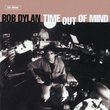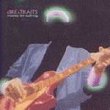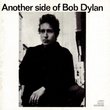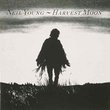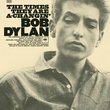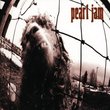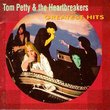| All Artists: Bob Dylan Title: Bringing It All Back Home Members Wishing: 1 Total Copies: 0 Label: Sony Original Release Date: 1/1/1965 Re-Release Date: 9/16/2003 Album Type: Hybrid SACD - DSD, Original recording reissued, Original recording remastered Genres: Blues, Folk, Pop, Rock, Classic Rock Styles: Contemporary Blues, Contemporary Folk, Singer-Songwriters, Blues Rock, Folk Rock Number of Discs: 1 SwapaCD Credits: 1 UPCs: 827969240120, 827969032664 |
Search - Bob Dylan :: Bringing It All Back Home
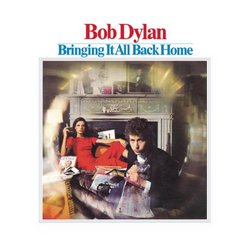 | Bob Dylan Bringing It All Back Home Genres: Blues, Folk, Pop, Rock, Classic Rock
"You sound like you're having a good old time," a purist Dylan fan is spotted telling the artist in the documentary Don't Look Back just after the release of this, his first (half-) electric album. He certainly does. Updat... more » |
Larger Image |
CD DetailsSynopsis
Amazon.com essential recording "You sound like you're having a good old time," a purist Dylan fan is spotted telling the artist in the documentary Don't Look Back just after the release of this, his first (half-) electric album. He certainly does. Updating Chicago blues forms with hilarious, tough lyrics--in fact, all but stealing the meter of Chuck Berry's "Too Much Monkey Business" for "Subterranean Homesick Blues"--on one side, dropping some of his most devastating solo acoustic science ("It's All Over Now, Baby Blue," "Mr. Tambourine Man") on the other, the first of Dylan's two 1965 long-players broke it right down with style, substance, and elegance. --Rickey Wright Similarly Requested CDs
|
CD ReviewsBob's first big shock... ewomack | MN USA | 05/15/2005 (5 out of 5 stars) "Some Dylan fans in late 1964 were still trying to figure out why Dylan no longer sang protest songs. His most recent release, "Another Side of Bob Dylan", moved away from the overtly political and angst ridden lyrics of "The Times They Are A-Changin'" and "The Freewheelin' Bob Dylan". Dylan began to write lyrics that probably seemed obscure and nonsensical to his fans at the time. Some are very funny. Some are so rich in imagery and layerings of meaning that even a few listens won't reveal what's going on. Or was the lack of obvious meaning the point? Nonetheless, "Another Side of Bob Dylan" still featured a Dylan playing accompanied by only an acoustic guitar, piano, and harmonica. Fans seemed okay with it until "Bringing it all Back Home" committed folk music heresy. Dylan went electric. And he didn't do it subtly. The album opens with a blast. "Subterranean Homesick Blues" introduces the folk blues rock that would dominate the rest of Dylan's career. The lyrics read like a warning to young people who just entered the real world: "Lookout kid you're gonna get hit". "Maggie's Farm" continues the electrified onslaught with its 'take this job and shove it' theme. "Outlaw Blues", "On the Road Again", and "Bob Dylan's 115th Dream" (complete with its bizarre false start) further explore Dylan's new blues territory. But blues rock doesn't exhaust this album's range. "She Belongs To Me", and "Love Minus Zero/No Limit" are beautiful ballads that explore the vicissitudes of relationships. The second half of the album features a mostly acoustic Dylan (with some subtle accompaniment). "Mr. Tambourine Man" went on to become one of his best known songs after the Byrds scored a #1 hit with it in 1965. "Gates of Eden", "It's Alright, Ma (I'm Only Bleeding), and "It's all over Now, Baby Blue" continue Dylan's new approach to lyrics. All are amazing songs in the acoustic Dylan tradition. One very interesting aspect about "Bringing it All Back Home" isn't preserved on the CD release. The vinyl LP release, like all LPs, had two non-continuous sides. Originally, side one ended with "Bob Dylan's 115th Dream". Side Two then began with "Mr. Tambourine Man". This had the effect of creating two separate worlds whenever one flipped the record. The electric Dylan on side one and the acoustic Dylan on side two. Dylan's folk fans probably wore out side two. For all the reasons mentioned above, "Bringing it All Back Home" remains Dylan's most abrupt transistional album. It also represents the largest shift in style Dylan made in his entire career. It's hard to imagine the shock the electrified Dylan sent through the folk scene of 1965. Dylan's set at The 1965 Newport Folk Fesitval is now legendary (his band was booed). Cries of "sellout" and even "Judas" rang from audiences (the latter can be heard on the 1966 Albert Hall Concert CD set). The film "Don't Look Back" from this era shows his folk fans questioning him why he "no longer sounds like himself". It caused an outright scandal in Dylan's main fan base. Despite this alienation, "Subterranean Homesick Blues" made the pop charts and greatly expanded Dylan's fan base. From this point on there was no turning back for Dylan. "Bringing it All Back Home" remains one of his best, and one of his most important, albums." The transformation from folkie to rocker begins Eric Edelin | Baltimore, Maryland USA | 10/12/2003 (5 out of 5 stars) "'Bringing It All Back Home' sounds a bit like the work of an artist who had ideas for two albums, but for some reason, decided to put the different-sounding material on one album. Bob Dylan, by 1965, was getting tired of playing "cause concerts" and folk festivals and wanted to play rock and roll. Of course, his stalwart fans at the time hated it, saying he abandoned them, but it was the first major evolution of an ever-evolving artist. 'Subterranean Homesick Blues' uncompromisingly jumps right into the fast rock and roll sound, along with the heavily electric 'Outlaw Blues' and 'Bob Dylan's 115th Dream' (my personal favorite of the album). It isn't until 'Mr. Tambourine Man' that any shades of Dylan's previous work are revisited. As a cohesive unit, this album is miles away from 'Highway 61 Revisited' or 'John Wesley Harding', but this album is a flawless collection of great songs, not unified by any certain sound and is probably the representative, definitive 1960s Bob Dylan album (simply based on the fact that it is more of a grab-bag type work, with heavy blues, rock and roll, ballads, surrealist epics, folk songs, and protest songs; just about every type of 1960s Bob Dylan song).This SACD/CD re-release is very clear and well-balanced. The mix sounds very bright, much like the 'Highway 61 Revisited' remaster, and avoids any kind of fake digital effects unlike a bit of of post-milennium remasters. The guitars are rock solid, the drums crack, and Dylan's voice is right up in the center. One can never truly appreciate Bob Dylan without owning this album. This is exceptional music." Bob Dylan: At His Best Jokerman1983 | Malibu, USA | 04/01/2008 (5 out of 5 stars) "Long having denied the implication that he created the folk-rock genre, rather giving the credit to Gene Clark of The Byrds, this release by the Bard from Hibbing would undoubtedly serve as the cornerstone of folk-rock through the ages! "Bringing It All Back Home" continues Dylan's introspection from "Another Side Of Bob Dylan" while adding electric instruments to the mix (a fact that, for some reason, would be acceptable to fans on record but not live at Newport). Here, Dylan can be at his most romantic one minute, with the Baez-inspired "Love Minus Zero / No Limit" or "She Belongs To Me," and simultaneously prophetic and surreal the next!
Introducing classics like "It's All Over Now, Baby Blue" and "Maggie's Farm" alongside concert stalwarts "Gates Of Eden" and "It's Alright Ma (I'm Only Bleeding)," this release would be the first of a trilogy ended all too soon by Dylan's supposed "motorpsycho nitemare." The other two albums in this trilogy are, of course, "Highway 61 Revisited" and the double-disc "Blonde On Blonde." Many will say that this is Dylan at his finest, placing the artist into an uncomfortable categorization or time capsule, but he would continue to produce highly creative and innovative work both with The Band and The Traveling Wilburys, as well as via his solo career throughout the 1970's and 80's. "Bringing It All Back Home" merely brings folk-rock to the forefront, introduces his audience to "Another Side Of Bob Dylan," and provides some excellent entertainment for the unsuspecting yet open-minded listener." |

 Track Listings (11) - Disc #1
Track Listings (11) - Disc #1